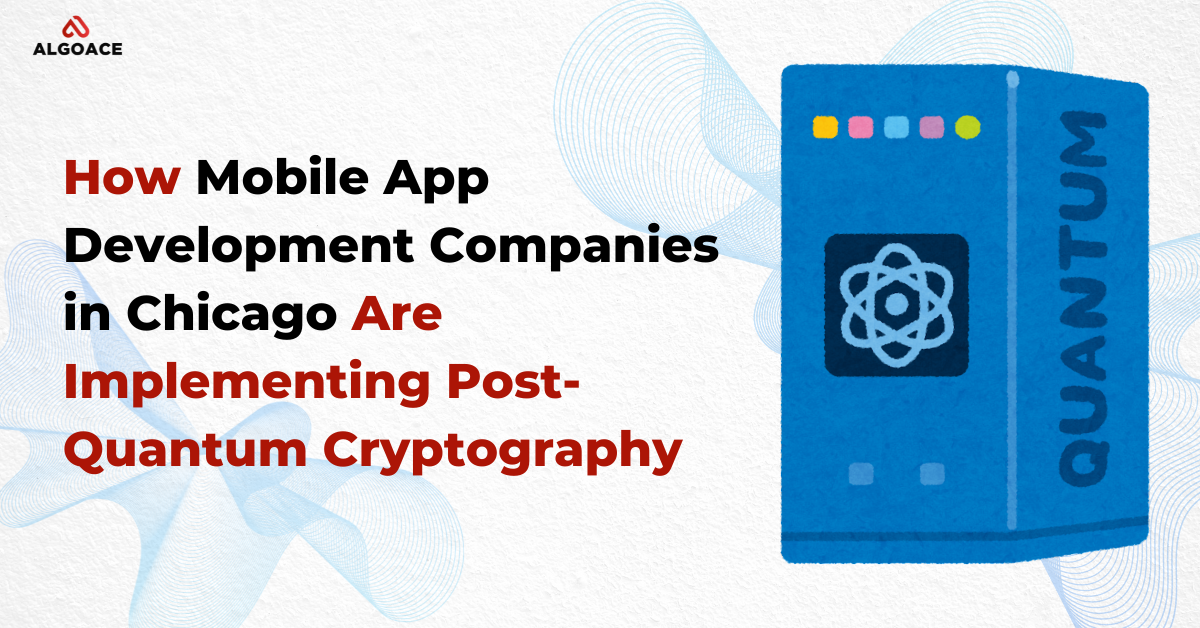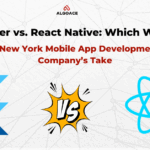
As the digital world progresses, so too do the risks associated with data security. The emergence of quantum computing presents a notable change that has led to a major transformation in cybersecurity strategies. Consequently, mobile app development companies in Chicago are focusing on post-quantum cryptography (PQC)—a new field aimed at resisting the computing capabilities of quantum technology.
This article will examine how the top tech companies in Chicago are gearing up for the quantum age by integrating post-quantum cryptography, the obstacles they encounter, and the implications for the future of mobile application security.
What Is Post-Quantum Cryptography?
Post-quantum cryptography encompasses cryptographic algorithms that maintain their security against attacks from quantum computers. Unlike traditional computers, quantum machines can tackle specific mathematical challenges at an exponentially greater speed. This creates a significant threat to existing encryption methods such as RSA, ECC, and DH, which are critical for secure communication.
PQC aims to establish cryptographic techniques that are resilient to both classical and quantum threats, making it vital for software development companies that prioritize security in their application designs.
Why Post-Quantum Cryptography Matters for Mobile App Development
The advent of quantum computing represents a serious danger to current encryption norms, rendering Post-Quantum Cryptography (PQC) essential for safeguarding mobile applications against potential future compromises. Implementing PQC now guarantees that your application’s data and user privacy are shielded from formidable quantum threats.
The Quantum Threat to Encryption
Modern mobile applications rely significantly on encryption to safeguard data, including personal details, payment information, and communications. Quantum computers pose a risk of making these encryption mechanisms obsolete.
The Need for Future-Proof Security
Proactive mobile app development companies in Chicago, much like leading iOS app development services in Austin, recognize the significance of making their applications resistant to future threats. Although large-scale quantum computers are not yet operational, data compromised today could be deciphered later, often described as a “harvest now, decrypt later” scenario.
This is why leading companies are actively researching and applying PQC to safeguard sensitive user information and ensure compliance with regulations.
How Mobile App Development Companies in Chicago Are Taking the Lead
Chicago has become a prominent center for technological innovation in the Midwest. Here’s how its mobile development sector is maintaining its edge in the face of quantum advancements.
1. Partnering with Academic and Research Institutions
Numerous mobile and software development companies in Chicago are working together with universities such as the University of Chicago and the Illinois Institute of Technology. These collaborations aim to:
- Investigate new PQC algorithms
- Evaluate the robustness of cryptographic techniques
- Disseminate discoveries across both public and private sectors
This partnership guarantees that the implementation of PQC is based on state-of-the-art research and optimal methodologies.
2. Integrating PQC into Development Workflows
Instead of waiting for widely accepted PQC algorithms, developers in Chicago have begun the integration process.
Key Steps Include:
- Algorithm Testing: Experimenting with algorithms from NIST’s PQC finalists like CRYSTALS-Kyber and Dilithium.
- Hybrid Cryptography: Employing hybrid systems that merge classical and quantum-resistant algorithms for enhanced security.
- Code Rewriting: Modifying codebases to accommodate new key sizes and cryptographic functions.
This forward-thinking strategy allows applications to achieve quantum resilience without necessitating a complete rewrite in the future.
3. Utilizing Quantum-Safe SDKs and APIs
To facilitate integration, various mobile app development companies in Chicago are using quantum-safe SDKs (Software Development Kits) and APIs that embed PQC into app features such as:
- Encrypted messaging with end-to-end security
- Secure user authentication
- Digital signatures
- Applications based on blockchain technology
Some organizations are also developing bespoke tools tailored to specific industry demands, particularly in fintech and healthcare, where data security is paramount.
4. Cloud and Infrastructure Adaptations
Transitioning to post-quantum cryptography encompasses more than just updating application code; it also includes larger infrastructure elements:
- Secure key exchange protocols designed to withstand quantum threats
- Quantum-resistant TLS setups for application backends
- Integration with quantum-safe cloud services like AWS and Azure, when available
By aligning infrastructure with application security, these companies ensure comprehensive protection in the quantum age.
Case Studies: Chicago Companies Leading in PQC
A. InnovApp Labs
Located in downtown Chicago, this mobile-centric company has started to transition its applications to hybrid post-quantum cryptography (PQC) systems. With a clientele spanning finance and healthcare, InnovApp Labs is leveraging lattice-based cryptography to secure encrypted messaging services.
B. ChiSecure Technologies
Focusing on cybersecurity for mobile applications, ChiSecure is partnering with NIST and nearby universities to evaluate quantum-safe authentication protocols in practical settings. Their goal is to create software development kits (SDKs) that can be utilized by other software development companies.
C. WindyCity Apps
A niche app development company, WindyCity Apps, has devised a unique framework for embedding PQC into Android and iOS applications. Their emphasis is on secure-by-design development that anticipates prospective threats.
Challenges in Implementing Post-Quantum Cryptography
Despite the significant advantages, mobile app development companies in Chicago face various obstacles in integrating PQC.
1. Algorithm Maturity
Numerous post-quantum algorithms are still undergoing the standardization phase. Currently, NIST has only chosen a select few algorithms, while others remain under consideration. The Mobile App Development Company in Qatar needs to find a balance between experimentation and practical application.
2. Performance Trade-Offs
Quantum-resistant algorithms can demand more resources:
- Larger key sizes
- Slower processing speeds
- Higher memory consumption
This could impact the user experience on mobile devices, particularly for applications with limited computational capabilities.
3. Backward Compatibility
Mobile applications frequently need to accommodate legacy systems. Integrating PQC without disrupting existing functionalities can be intricate and time-consuming.
4. Developer Education
Grasping quantum threats and post-quantum cryptography comes with a steep learning curve. Companies must allocate resources for training and enhancing the skills of their development teams.
Benefits of Early Adoption for Mobile App Developers
Even with the obstacles, the early integration of PQC provides various benefits for software development companies and mobile developers in Chicago.
Competitive Edge
Being prepared for quantum challenges ahead of rivals enables companies to create secure applications that attract privacy-focused users and sectors with strict regulations.
Compliance Preparedness
As regulatory agencies begin to demand quantum-resilient security, particularly in industries such as finance, defense, and healthcare, those who adopt early will be in a strong position to fulfill these requirements.
Customer Trust
Implementing PQC fosters user confidence by showcasing a dedication to data protection, both currently and for the future.
The Role of Government and Industry in Chicago
The City of Chicago and the State of Illinois have been channeling resources into quantum research projects. The Chicago Quantum Exchange, a partnership among national laboratories and universities, aims to establish the city as a leader in quantum technology. This collaboration between the public and private sectors enhances innovation among mobile app developers in Chicago by providing:
- Funding and grant opportunities
- Access to research in quantum computing and testbeds
- Programs for workforce development
By nurturing a supportive environment, Chicago is well-positioned to spearhead advancements in mobile app security for the post-quantum era.
Tools and Resources for PQC Integration
Here are some essential tools and frameworks utilized by software development companies in Chicago:
- Open Quantum Safe (OQS): This initiative offers libraries and tools designed for quantum-safe cryptography.
- liboqs: A C library that implements post-quantum cryptography algorithms for SSL/TLS applications.
- Bouncy Castle PQC: Java libraries that support algorithms relevant to post-quantum cryptography.
- Microsoft’s PQCrypto VPN: An experimental quantum-safe VPN prototype utilizing Kyber and Dilithium.
These tools enable developers to begin their experiments with post-quantum cryptography right away.
Future Trends in Quantum-Resistant Mobile Apps
Looking forward, we anticipate:
1. Standardization of Algorithms
As NIST concludes its PQC standards, we expect a surge in adoption across various sectors.
2. Native OS-Level Support
Operating systems like Android and iOS may incorporate PQC functionalities natively soon, facilitating easier adoption for app developers.
3. Increased Demand in Regulated Industries
Industries such as finance, healthcare, and government will increasingly require PQC-enabled applications as part of their compliance and risk management efforts.
Conclusion
While quantum computing is still emerging, its effects on mobile app security are already pressing. Mobile app development companies in Chicago are prudently taking steps to research, incorporate, and assess post-quantum cryptographic techniques at present.
By pioneering these efforts, these companies not only secure their products for the future but also establish a benchmark for the coexistence of innovation and security. For any software development companies looking to remain pertinent in a swiftly evolving digital environment, now is the moment to adopt post-quantum cryptography.





0 Comments